How Nang Fha Got to Arizona
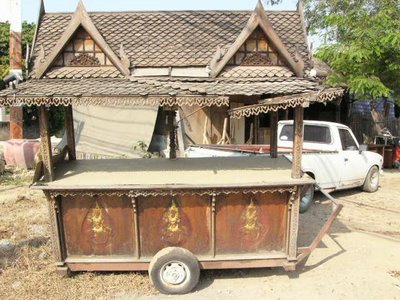
To Arizona....

It all started at lunch (January 2006) in the lobby restaurant at the Four Seasons (f/k/a The Regent, and then The Four Seasons Regent, the most beautiful hotel public space in Bangkok), with my good Thai friend, Noon, who, besides being a successful businesswoman, is also a professional photographer with a show to her credit. Noon mentioned to me that she had bought several wood panels and that I could have one at her cost. She thought I'd really like it, but she didn't have a picture to show me just yet. I thanked her, but told her I didn't have any place to hang it in my apartment. Noon, who now lives in the Netherlands, told me that she was taking two of the panels back with her, and she suggested that I take one to Arizona. She informed me that each panel separated into three pieces, which could be bubble-wrapped and easily carried on an air plane, and then reassembled in Arizona. It was too much of a bother, I said. Anyway, it sounded like a project and I didn't want any projects right now.
After she returned to her home in Utrecht, Noon e-mailed me a picture of the panel.
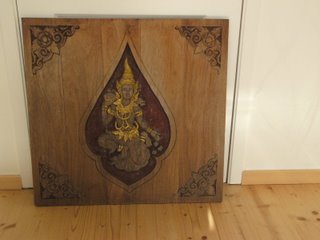
I liked it immediately. She told me that she had no trouble taking the six pieces comprising the two panels, on the plane, with her and that it looked beautiful in her house. She said that she wanted to hang it over her bed, but that the wall would probably not support the weight of the panel, and she was scared that it would fall on her as she slept. She would have to find a safer location for it in her house. The other panel was to be sold to a Thai restaurant in Utrecht.
When Noon mentioned hanging the panel over her bed, it gave me an idea. In July 2005, the inside of my house in Arizona had been destroyed by a flood caused by a defective toilet, and the two dog pictures over my bed were casualties, which needed to be replaced. It occurred to me that the panel would look beautiful over my bed, and I knew that properly hung, there was no danger of it falling, no matter how heavy it might prove to be.
Still, I didn't want the bother. I thought it would be more practical to buy one or two prints in either China, where I was planning to visit again this year (2006), or in Europe, where I was planning to go at the end of 2006 or early 2007. Two prints could be put in a small and light mailing tube and mailed to me in Arizona, where I would have them framed. I'd done this before with a print purchased in Vienna, and found that it was not difficult to do. So, again I told Noon, "no."
The more I thought about it though, the more I liked the idea of having Nang Fha in Arizona. But, I had another, more practical thought. About two years ago, I had a young artist from Isaan, primarily an agricultural region and the poorest part of rural Thailand, paint a picture for me, which I really liked. It's now framed and hanging over my bed in my Bangkok apartment.
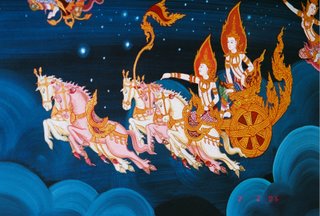 I thought it would be easy to ask him to paint another picture for me, similar, but not identical, for my Arizona bedroom. I liked the ease of that idea and I could picture it above my bed, and believed that it would change the look of my bedroom in a way that would compensate for the loss of the two dog pictures, which my mother bought cira 1948.
I thought it would be easy to ask him to paint another picture for me, similar, but not identical, for my Arizona bedroom. I liked the ease of that idea and I could picture it above my bed, and believed that it would change the look of my bedroom in a way that would compensate for the loss of the two dog pictures, which my mother bought cira 1948.I couldn't make up my mind, but I was leaning towards Nang Fha. I e-mailed Noon and asked her to give me another two weeks to make up my mind before she sold the panel to Meng, Noon's friend and personal assistant in Thailand, and my former English student. Noon e-mailed back that two weeks was okay.
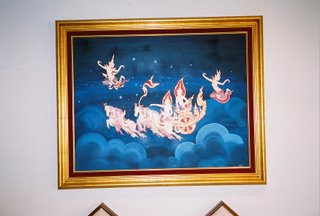
Because I needed someone to break the logjam in my mind, I contacted my interior designer, Clarice, and asked her to make the decision. I e-mailed her pictures of Nang Fha and the painting above my bed in Bangkok (Picture Left), and almost immediately, she opined that Nang Fha was the one, that she loved it.
That did it. I e-mailed Noon in the Netherlands and told her I wanted the wood panel. She said that Meng would have to pick it up in her village over the weekend, and that I should call Meng to make arrangements for her to bring it to my apartment when she returned to Bangkok on Monday.
Since I hadn't seen the panel as yet, I was eager to view my purchase, but I was also looking forward to seeing Meng again after about a three-year hiatus. Meng, a Thai about 35 years of age, works in a middle management position in the Bangkok office of a large Korean multinational company. Top management is Korean only. Well, the Koreans don't speak Thai and the Thais don't speak Korean, so business at the company is transacted almost entirely in English. I think this is part of what we now call globalization.
At any rate, Meng was up for a major promotion, which entailed a structured test and performance program lasting a year, all of which was conducted solely in English. Meng wanted to improve her English, so she came to me for private lessons and coaching built around her interview, writing and oral presentation requirements for the promotion.
We worked weekly for a year, and Meng got the position. She was very complimentary about the role I played, which made me feel very good. Meng and Noon had been friends for a long time, and it was Noon who had referred Meng to me.
Meng brought the panel to me in three pieces wrapped in newspaper. We unwrapped them and laid them out on the only table in my apartment large enough to hold it. It was easy to figure out how the pieces fit together.
When assembled, it's beauty was immediately apparent. The e-mailed photo, while accurate, did not convey the impact of the beautiful wood, the detail of the carving, and, mostly notably, the gorgeous, bright gold. I was prepared to like it; I wasn't prepared to be this thrilled. My only thought was to get it back to Arizona as quickly as possible, undamaged. If nothing else, I had the beginnings of a family heirloom.
When I like something, I want to get as much information about it as I can. Usually, I read or search the Internet. With Nang Fha, I relied on information from Noon, and from some others I talked to in Bangkok.
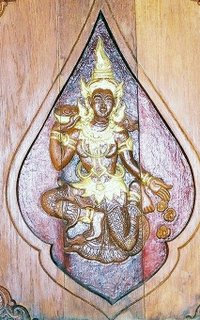 Nang Fha is the Thai word for "fairy" or "angel," and the figure in the panel is, of course, a representation of a Thai fairy or angel. Nang fha is not connected with Buddhism and this is not a religious piece. It is more of a good luck symbol having its roots in Thai mythology. I asked several Thais whether my nang fha was a male or female, or perhaps, androgynous. Some said male and others female, but the consensus was that this nang fha was a female. Because of the unmistakable fulsome breasts, I agreed with the consensus, and I thought that if this were a male, he had a serious hormone problem.
Nang Fha is the Thai word for "fairy" or "angel," and the figure in the panel is, of course, a representation of a Thai fairy or angel. Nang fha is not connected with Buddhism and this is not a religious piece. It is more of a good luck symbol having its roots in Thai mythology. I asked several Thais whether my nang fha was a male or female, or perhaps, androgynous. Some said male and others female, but the consensus was that this nang fha was a female. Because of the unmistakable fulsome breasts, I agreed with the consensus, and I thought that if this were a male, he had a serious hormone problem. Nang fha is holding a bowl of flowers with one hand, which she is scattering with his other hand. A good title for this work would be "Fairy Spreading Flowers." The flowers carved into the four corners of the panel are from an orchid cactus, which my Thai dictionary says is also known as "Queen of the Night" and nightbloming cereus, which an Arizona friend has kindly told me grows prolifically in Arizona and California. I'll certainly look for it the next time I visit.
The flowers carved into the four corners of the panel are from an orchid cactus, which my Thai dictionary says is also known as "Queen of the Night" and nightbloming cereus, which an Arizona friend has kindly told me grows prolifically in Arizona and California. I'll certainly look for it the next time I visit.
I was, of course, committed, but the problematic framing and shipping questions remained. Even though the three constituent panels were heavy, Noon's maneuver of carrying them on the plane was doable and was the easiest and least expensive shipping option. But, when I got them to America, I was faced with mounting and framing, which would be costly, and I was uncertain if I could match the wood of the panel.
A friend from Europe had a good suggestion. He suggested that I have the frame designed and cut in Bangkok, but that I take it unassembled to the U.S. and have a frame store assemble it here. That would be a lot cheaper than having it designed and built in the U.S. In other words, he was proposing a "dry run" in Bangkok. That sounded real good to me, a workable compromise, so to speak. My next stop, one way or the other was thus clear---a frame shop in Bangkok.
I had had some work done at two frame shops, but I didn't think that they were capable of handling this project. I felt I needed someone who was really creative and skilled. Fortunately, one of my friends is a former movie star, who is now a professional artist, a painter, who has annual, widely-covered and well-received solo shows in Bangkok, which I have attended over the years. I asked her whom she would recommend, and she gave me the name of the framing shop that did her work, and the designer in the shop with whom I should talk. Surprisingly, the shop was right around the corner from my apartment. I had passed it countless times, but never particularly noticed it.
The next Saturday, with pictures of Nang Fha in hand, I went to the shop, C.V.N. Art Center on Sukhumvit Road, and met the designer, Khun Noy. After looking at my pictures, she agreed that she could and would undertake the project. I was more than satisfied because I saw many beautiful framed pictures and some wooden objects in the shop. I knew I was in the right place.
Off I went to my apartment, via a shortcut that Noy showed me, of which I was unaware after living six years in the neighborhood, and which I now use regularly. I carried the three panels back to the shop, a job I should have undertaken in two trips.
Khun Noy and I laid the panel out on a work table and began experimenting with different designs, colors, woods, textures and the like. After about an hour, we had come up with a frame that both of us liked. The creativity was hers; the decisions were mine.
Khun Noy told me the price, cheap by any standards, and I readily agreed. Because I had opted for an elaborate frame, I knew that I couldn't take it to Arizona unassembled, but I asked her anyway, and she confirmed the obvious. I would just have to pay the costs of crating, fumigation (a customs requirement because it was wood), and air freighting. Oh well, it would be worth it.
The mounting and framing would be complete in 10 days and I didn't give it much thought. In fact, I was a few days late in picking it up. I entered the back of the shop by a side entrance off the subsoi and almost immediately saw nang fha on the floor leaning against a wall. It was beautiful. Khun Noy must have heard me "ah" and quickly appeared. I asked her to put nang fha on an easel and in better light, which she did.  I profusely thanked her and expressed how elated I was with the result. I asked to meet the craftsman who actually did the work, and she called him down from the workroom above and I thanked him as well. His name is Khun Dtit and he is C.V.N.'s most experienced artisan. He was too shy to say much, but I got the impression that he enjoyed working on nang fha.
I profusely thanked her and expressed how elated I was with the result. I asked to meet the craftsman who actually did the work, and she called him down from the workroom above and I thanked him as well. His name is Khun Dtit and he is C.V.N.'s most experienced artisan. He was too shy to say much, but I got the impression that he enjoyed working on nang fha.
In January 2006, Noon, while visiting Ban Pong in Ratchaburi province (often pronounced "Rat'buri"), saw an old, forlorned, vendor's cart for sale, and, with her artist's creative eye, she recognized it's value as something other than it's original intended purpose.
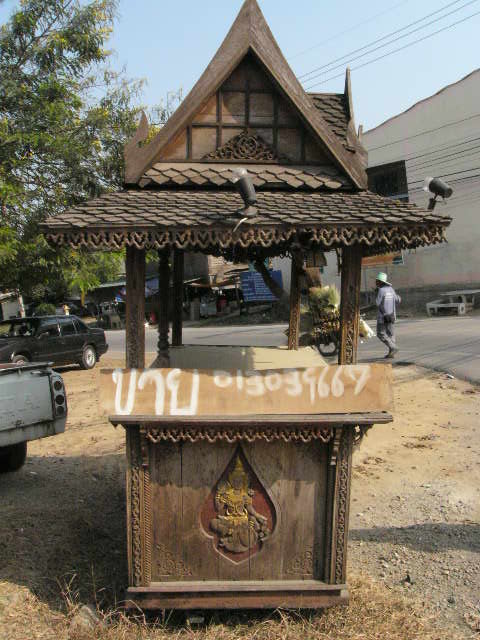
Through the telephone number pasted on the cart, she contacted the owner, who told her it was 20 years old (later corrected to 15 years by the person who actually did the carving). For many years the cart was used to sell kloy kak, typical Thai snacks of deep fried banana, potatoes, yams, which are incredibly delicious, but of doubtful healthfulness. Noon asked several of her friends to chip in and buy the cart with her, and, with her usual thoroughness and keen interest in all Thai art, she tracked down the artist, a teacher, who actually carved the panels in Supan Buri, about 15 years ago, from a special teak wood called golden teak, he said. To maintain the integrity of the work, I made sure that the frame I commissioned was likewise made entirely of teak wood.
After completing the purchase, which was preceded by serious negotiations about price, a necessity in Thailand (Noon told me a long time ago "Never be embarrassed to offer too little in Thailand"), and as Noon and her friends were dismantling the cart, the vendor had seller's remorse and wanted to rescind the deal, but the cart was already on it's way around the world.
There were five nang fha panels on the cart, three in the front and one on each side. Two of the panels are in the Netherlands, one in Noon's house, and the other in a Thai restaurant in Utrecht. Two are in Bangkok, one with Meng, and the other with another good friend of Noon's. Arizona, of course, is now home to the fifth panel. As for the cart itself, it has been refinished and is now a garden piece at a home in Bangkok. Because it is teak, it can withstand the rain and heat.
As soon as the frame was completed, I shipped it to Clarice in Arizona and it proceeded me there by several weeks. With her handyman, Ed, Clarice brought the heavy crate to my house, unpacked Nang Fha and put it in my bedroom, it's intended final resting place, to await my arrival.
Clarice had asked me if I wanted her to hang it, but I opted to wait until I could supervise the installation. I'm glad I did, for when I saw Nang Fha in my house, I knew immediately that it had to go in the most prominent place in the house, over the fireplace in the living room, to replace a quite nice original American Indian oil painting, which I moved to my den. The result speaks for itself.

Left. Nang Fha in my Living Room

Right. Another view.
This saga has an unexpected happy post script. A fine frame shop, Best Lil' Frame Shop, was able to substantially remediate the water damage spots on the Richard Thompson watercolors, the English and Irish setters, and, rematted, they once again hang over my bed in the place I had envisioned for the Nang Fha.

Since I've had these beautiful dogs in my bedroom since I was a child of 10, I was happy to have them looking over me once more. The Nang Fha, high in the living room, is now protecting us all, bringing the good luck that is her wont in life.


